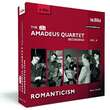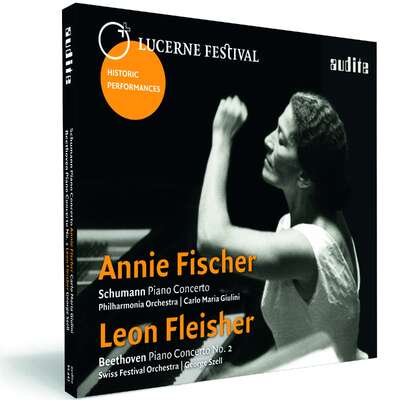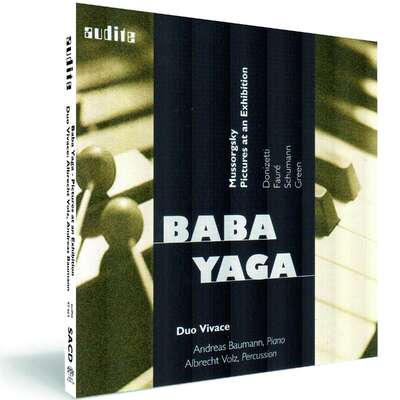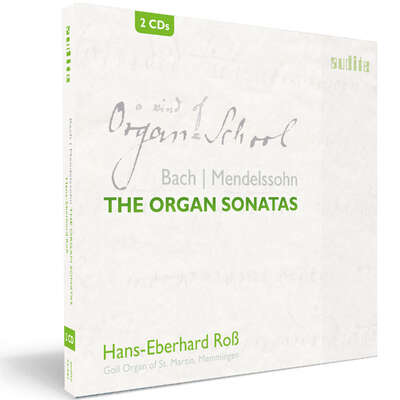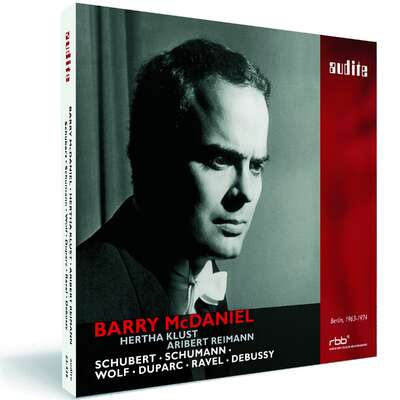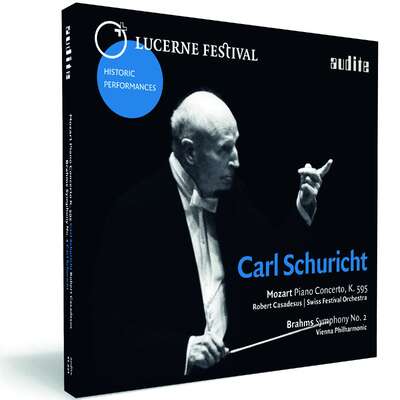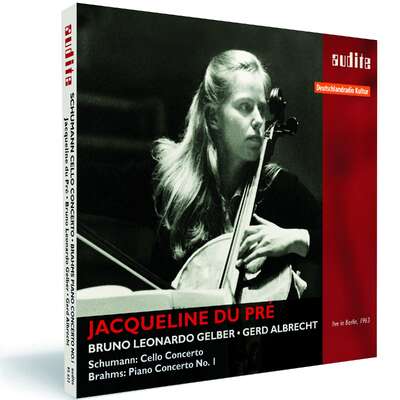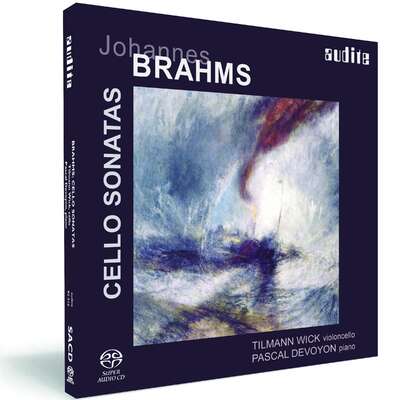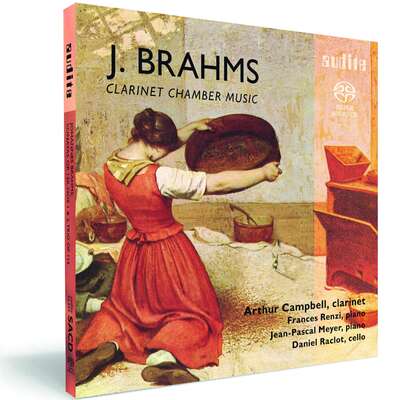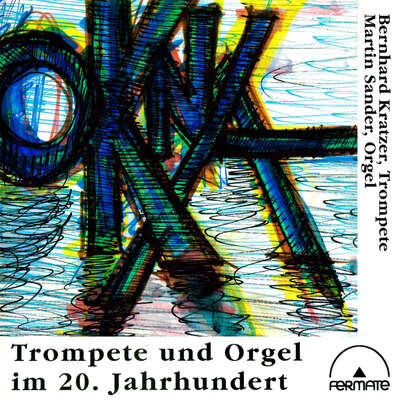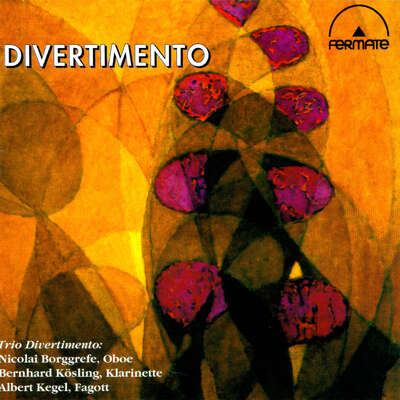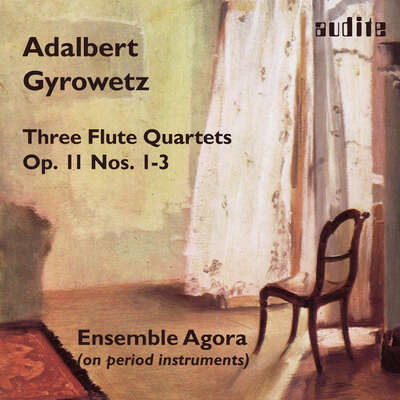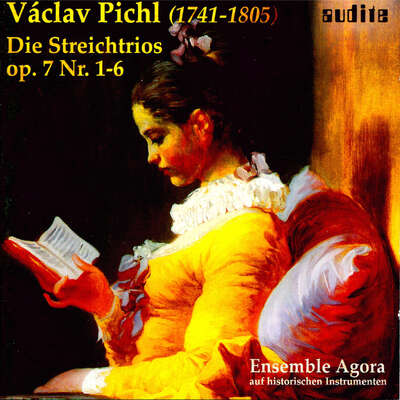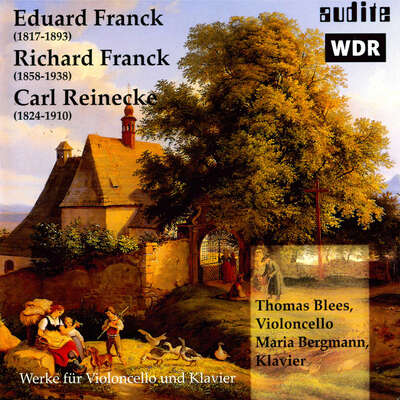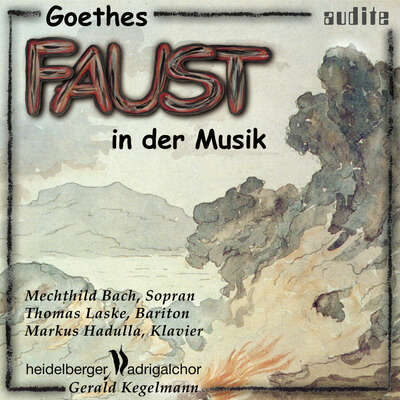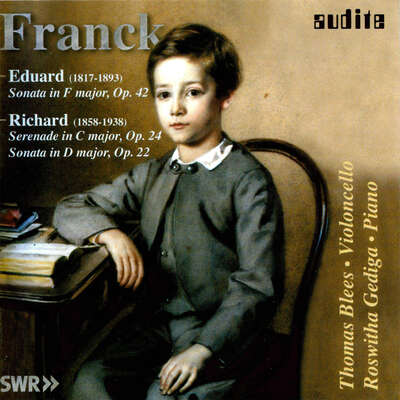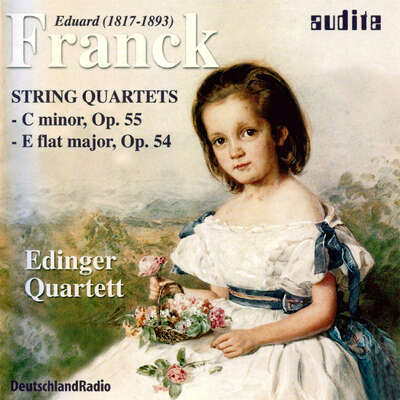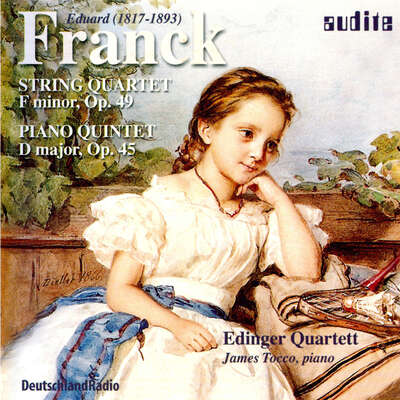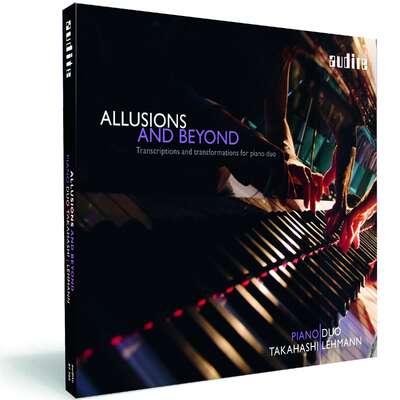
Several works can be heard here in interpretations by the Amadeus Quartet for the first time on CD – over a third of the repertoire featured in this recording. Schumann and Grieg are composers who had been completely absent in the quartet’s discography up until now, and every recording is a first CD release – making this edition a truly historical document. The Amadeus Quartet was noted for their intensive commitment to Romantic chamber music for strings, with a particular emphasis on the works of Johannes Brahms. Notable soloists and guest musicians are involved in around half of the works recorded. more
"The original broadcast tapes have been outstandingly well realised [...] In short, exemplary presentation, and a richly valuable box." (Musicweb international)
Track List
Details
| The RIAS Amadeus Quartet Recordings - Romanticism | |
| article number: | 21.425 |
|---|---|
| EAN barcode: | 4022143214256 |
| price group: | BCG |
| release date: | 25. November 2016 |
| total time: | 375 min. |
Bonus Material
- digibooklet
-
Producer's comment
First-hand impressions of producer Ludger Böckenhoff [german]
Informationen
The fifth CD boxed set, Vol. V, from the series The RIAS Amadeus Quartet Recordings is dedicated to nineteenth-century Romantic composers. This six-volume edition presents exclusively first releases on CD.
The Amadeus Quartet included a wider repertoire in the broadcasting studio than in the recording studio. Works by Edvard Grieg and Robert Schumann interpreted by the Amadeus Quartet can be heard here for the first time on CD. And five works in this edition represent novel repertoire that the Amadeus Quartet never recorded on LP: Dvorák's Piano Quintet in A Major, Op. 81, Grieg's String Quartet in G Minor, Op. 27, Mendelssohn's String Quartet in E-flat Major, Op. 12, as well as Schumann's String Quartet in A Major, Op. 41, No. 3 and Piano Quintet in E-flat Major, Op. 44.
Only half the works recorded here belong to the string quartet genre. The Amadeus Quartet enjoyed collaborating with other musicians and did so often. In the three piano quintets by Brahms, Dvorák, and Schumann, they performed together with pianist Conrad Hansen, who had appeared with the Berlin Philharmonic under Wilhelm Furtwängler in the 1940s. In the string quintets by Brahms and Bruckner, the Amadeus Quartet is joined by South African-born Cecil Aronowitz - the musician they always turned to when in need of a second violist. And in Brahms's Clarinet Quintet we hear Heinrich Geuser, regarded as Germany's leading clarinetist in the 1950s.
Reviews
www.musicweb-international.com | December 2017 | Jonathan Woolf | December 1, 2017 | source: http://www.music... Recording of the Year
Volume 5 in Audite’s survey of the Berlin broadcasts of the Amadeus Quartet is undoubtedly the most important yet. Works wholly new to theMehr lesen
www.musicweb-international.com | Tuesday November 14th | Jonathan Woolf | November 14, 2017 | source: http://www.music...
The fifth volume in Audite’s superbly refurbished boxed series covers a two-decade period from 1950-69 during which time the Amadeus Quartet setMehr lesen
The first three CDs are largely given over to Brahms. In the case of the C minor Quartet, Op. 51 No. 1 the recording is slightly shrill in the strings’ upper register – this is something that is noticeable in a number of these earliest incarnations – though not enough to limit one’s enjoyment of the performances. What one may lose in this acidic quality is more than made up when the playing is so vitalised and dramatically purposeful. The tonal breadth of the Romanze survives any possible aural impediment. It’s the quality of refinement that demarcates the Op. 67 Quartet where one finds Norbert Brainin’s beautiful phrasing in the Andante one of the most distinguishing markers of excellence. The 1957 recording quality is decidedly warmer, aerating the ensemble’s textures to considerable advantage. A couple of days after the Op. 51 No. 1 performance the quartet returned to the radio studio to play the Piano Quintet in F minor, Op. 34 but not with one of their familiar colleagues, Clifford Curzon, but instead with Conrad Hansen. He is perfectly in tune with the conception, his own contribution being eminently well-balanced: playing of strong identity but selfless integration. Note his pizzicato-like paragraphs in the first movement, and the scaled question-and-response between the strings and piano, as well as the expressive inner voicings in the slow movement and the Scherzo’s sweep. In the beautifully phrased Clarinet Quintet, chronologically the last work in the box to have been composed, the Amadeus is joined by Heinrich Geuser. A distinguished orchestral principal, teacher and soloist he had a considerable influence on the succeeding generation of clarinets, one of whom – Karl Leister, the most famous German player of his generation – was later to record the Clarinet Quintet with the Amadeus.
For the String Quintet, Op. 111 they are joined by their violist of choice, Cecil Aronowitz, for a September 1953 performance of vivid communicative power where the rhythmic pointing in the finale is as persuasive as the elements of rusticity embedded in the music. The Bruckner Quartet is sonorously declaimed but they manage to locate the wit in the Scherzo that prefaces the sustained gravity of the Adagio. Though they performed Schumann’s chamber music in concert and for radio broadcast they never took any of the music into the studio, which makes the appearance of the Op.44 Piano Quintet and the A major Quartet, Op. 41 No. 3 so exciting. The former is again with Hansen in a performance dating from February 1962 notable for the flowing lyricism of the second movement and in the sensitive balance maintained in the finale. The A major’s fugal and rustic predilections are happily brought out, the country dance that courses through the finale being a particularly good example of the Amadeus’ art. The recording quality is generous enough to make the quartet sound more characteristically themselves here than in some of the earliest readings. Even in a box this fine, disc four is therefore particularly valuable for reasons of repertoire and interpretation.
But then so too are the final discs. The Amadeus never recorded Mendelssohn’s E flat major – listen to the lavishly applied tone in the Beethoven-inspired slow opening section of the first movement – but they certainly don’t stint the expressive intensity of the slow movement. They did record the Capriccio from the Op. 81 Quartet as a stand-alone, and reprise that here. Perhaps surprisingly they’d had the Verdi Quartet in their repertoire right from their 1948 Wigmore Hall debut so by November 1962 it had been under their fingers for a decade-and-a-half. They’d learnt to mitigate any inherent problems in the writing whilst remaining excitingly earthy in the Prestissimo third movement. It’s perhaps strange too to realise that they left behind only a single Dvořák work – inevitably, the American quartet – so the A major Piano Quintet, Op. 81 is another item new to their now-expanding discography. Hansen is again good in this 1950 reading – one can draw parallels between this interpretation and that of Curzon and the Vienna Philharmonic Quartet at around the same time, as well as on the wing with the Budapest Quartet. The Amadeus drive when required though their rhythms aren’t quite as pungent as the best Czech ensembles. Finally, there is yet another newbie, the Grieg Quartet. If your standard is the impossibly high pre-war 78rpm set by the Budapest, then you will find the Amadeus not too far behind in matters of tonal breadth. It’s a stylish reading and very communicatively presented.
The six CDs in this box offer great rewards for the Amadeus collector. The items new to their work list are clearly of the greatest interest and it’s doubly valuable that the performances of these are no less compelling than the companion works. It’s also good to hear from their collaborative artists – Aronowitz, the only violist they performed with, the great clarinetist Geuser and, of course, Hansen who makes a consistently fine impression. The original broadcast tapes have been outstandingly well realised: they’re all mono with the single exception of the Mendelssohn Op. 12. In short, exemplary presentation, and a richly valuable box.
www.artalinna.com | 8 October 2017 | Jean-Charles Hoffelé | October 8, 2017 | source: http://www.artal... La vérité sur les Amadeus
Sommet de l’album, le Quatuor de Grieg, œuvre géniale qu’ils ne gravèrent jamais au disque et qu’ils magnifient par un engagement de tous les instants [...]Mehr lesen
Gramophone | October 2017 | Rob Cowan | October 1, 2017
Chamber of delights
The Amadeus Quartet on vintage form in Romantic repertoire and a much-recorded Danish pianist
With a time frame that stretches from 1950 to 1969, Audite's fifth volume of RIAS Amadeus Quartet Recordings catches this great ensemble at the heightMehr lesen
Mendelssohn is represented by a fiery account (1952) of the Capriccio from Op 81 (a work the group did record complete), especially striking at its fugal centre; and the Quartet in E flat major, Op 12 (1969), which features a warmly phrased account of the opening Adagio.
Schumann is another curious absentee from the Amadeus's official discography, the Piano Quintet in E flat (1950) most engaging where in the first-movement exposition (played with repeat) the second theme is handed between the viola and the cello, whereas the Scherzo illustrates how well pianist Conrad Hansen establishes a strong presence without overwhelming his colleagues. How lovely, too, Brainin's playing in the Trio. Hansen also cues a gently rocking lullaby for the opening of Dvorak's Piano Quintet (1950), and all five players alternate poetry and high spirits for the Dumka second movement: note the wild accelerando from 7'24", before Hansen calls a halt and Brainin weeps his line with a mournful (though never overwide) vibrato and marked portamentos. This is vintage Amadeus artistry.
It's interesting that for the opening bars of the third movement of Brahms's First Quartet (1950) they take the written hairpin dynamic as a cue to enter on an aching rallentando, an option they also take on their two commercial recordings of the score, though here it's more marked. This darkly introspective reading is in marked contrast to the more songful, even genial, account from seven years later of Op 67, the finale's variations bringing the work to a colourful conclusion. The finale of the Op III String Quintet (1953, with Cecil Aronowitz), however, really fuels the flames, especially at its centre, though for sheer ebullience the opening can't compare with a roughly contemporaneous Sony recording from the Casals Festival at Prades with Isaac Stern, Alexander Schneider and friends (coupled with the Schumann Piano Quintet with Myra Hess), a classic that's surely due for a local reissue.
The other featured Brahms Quintets involve clarinettist Heinrich Geuser (1951), whose mellow playing fits the music's mood to perfection and Hansen (1950) whose contribution to the Piano Quintet, and the finale in particular, is powerfully communicative. Which leaves Bruckner's F major Quintet (195 7), lovingly played form start to finish (movingly emotional in the Adagio) and Verdi's E minor Quartet (1962), not quite in the same class musically as the Bruckner but very well played.
So, in closing, I'd say that of the six volumes of this invaluable edition, perhaps Volume 5, 'Romanticism', is the most treasurable of all, given the number of Amadeus repertoire rarities it includes. The transfers, all from excellent mono radio tapes, are consistently excellent. […]
Record Geijutsu | 2017.5 | May 1, 2017
Japanische Rezension siehe PDF!Mehr lesen
hifi & records | 2/2017 | Uwe Steiner | February 1, 2017
Amadeus Quartet
RIAS Berlin 1950 -1969, Vol. V: Romantische Kammermusik von Brahms, Schumann, Dvorak u.a.
Die meisten der bestmöglich restaurierten Interpretationen waren bisher kaum zugänglich, und auf CD bislang gar nicht. [...] Eine Fundgrube!Mehr lesen
Diapason | 2/2017 | Jean-Michel Molkhou | February 1, 2017
Des cinq coffrets que compte déjà cette passionante série (cf. nos 618, 622, 626, 631), et en attendant le dernier consacré à Haydn, le presentMehr lesen
L’Adagio surpasse tout ce qu’on avait pu entendre jusque-lá. Aucune trace des Amadeus dans Mendelssohn, si ce n’est dans le bref Capriccio grave en 1955 chez HMV? C’était avant la découverte de cet Opus 12, partition d’un lyrisme radieux, captée en 1969.
Norbert Brainin s’en donne à coeur joie, usant de son vibrato inimitable, veritable signature de l’ensemble, nous entrainant dans l’élégance féerique, innocente ou pathétique, de cet univers si propre à son auteur.
Deux autres suprises nous attendant dans le dernier CD: le Quintette en la majeur de Dvorak dans une lecture particulièrement enjouée, puis une interprétation aussi personnelle que spectaculaire du Quatuor op. 27 de Grieg. Dans les autres oeuvres, on comparer aces capitations de jeunesse avec les gravures officielles, souvent très postérieures. C’est le cas du quatuor de Verdi, beaucoup plus tendui ici en 1962 que dans la gravure DG tardive de 1979. Tous dates des années 1950, leurs Brahms sont aussi fervents que touchants dans ces bandes de Radio réalisées sans montage, qui leur laissent exprimer tant de spontanéité. On reste envoûté dans l’Allegretto de l’opus 51 n° 1 ou dans l’Agitato de l’Opus 67, sans vouloir perdre une miette de l’Opus 34 ni du dialogue Brainin / Geuser dans l’Adagio de l’Opus 115, fascine par la complicité fusionnelle avec celui qu’on surnomma le cinquième home du quatuor, l’altiste Cecil Aronowitz (ne manqué surtout pas l’Adagio du Quintette en fa majeur de Bruckner).
www.pizzicato.lu | 17/01/2017 | Uwe Krusch | January 17, 2017 | source: http://www.pizzi... Meister auch der romantischen Klänge
Die mit der Folge ‘Romanticism’ fortgesetzte Reihe der Veröffentlichungen der RIAS-Aufnahmen des Amadeus Quartetts widmet sich in diesem fünftenMehr lesen
Als Besonderheiten dieser historischen Einspielungen kann man benennen, dass einige Stücke wie das Verdi-Quartett oder die Schumann-Werke vom Amadeus Quartett zwar im Konzertsaal gespielt, aber nie auf Platte aufgenommen wurden, sondern nur fürs Radio. Außerdem sind mit sechs der dreizehn Stücke viele Quintette eingespielt. Dabei haben sie für die Streichquintette auch hier auf ihren einzigen Partner in dieser Formation, Cecil Aronowitz, gesetzt.
Mit Heinrich Geuser, der mit seinem ausdrucksvollen Ton eine ganze Generation von jungen Klarinettisten geprägt hat, haben sie das Klarinettenquintett von Brahms eingespielt. Als Pianisten für die Klavierquintette haben sie Conrad Hansen gewählt und sind damit von ihrem üblichen Partner Clifford Curzon abgewichen. Auch Hansen konnte auf eine reiche Solisten- und Lehrtätigkeit zurückblicken.
Das Quartett hat in den vierzig Jahren seines Zusammenspiels mit konstanter Besetzung eine Harmonie und ein tiefes Verständnis füreinander entwickelt. Obwohl die Aufnahmen teilweise schon wenige Jahre nach Gründung des Quartetts entstanden sind, ist dieses enge Miteinander in allen Aufnahmen zu hören. Die Romantik wird hier wohlklingend warm gezeichnet. Das führt allerdings nicht dazu, dass auch nur ein Moment langweilig oder routiniert klingt. Man spürt immer das Engagement und Intensität. Selbst das Grieg Quartett, das man auch schon disparater gehört hat, klingt schön, aber eben nicht spannungslos. Vor dem Hintergrund, dass die Aufnahmen ohne die Möglichkeit der Nachbesserungen wie unter Konzertbedingungen aufgenommen worden sind, offenbart sich die Meisterschaft des Ensembles umso mehr.
The Amadeus Quartet’s performances are enthralling and show one of the great quartets of the second half of the last century in perfect togetherness and with total commitment.
ensuite Kulturmagazin | Dezember 2016 | Francois Lilienfeld | December 1, 2016 Die «Zweite» Schumann: Klaviere oder Orchester?
Obgleich die meisten der hier eingespielten Werke auch im Studio aufgenommen wurden (Westminster und vor Allem Deutsche Grammophon), lohnt sich die Anschaffung der audite-Sammlung als interessante Vergleichsbasis. Und die Schumann-Werke (ausser dem Quintett noch das Streichquartett A-dur op. 41 Nr. 3) sind sonst auf keinem Tonträger dokumentiert.<br /> Mehr lesen
News
The fifth volume in Audite’s superbly refurbished boxed series covers a...
Des cinq coffrets que compte déjà cette passionante série (cf. nos 618, 622,...
